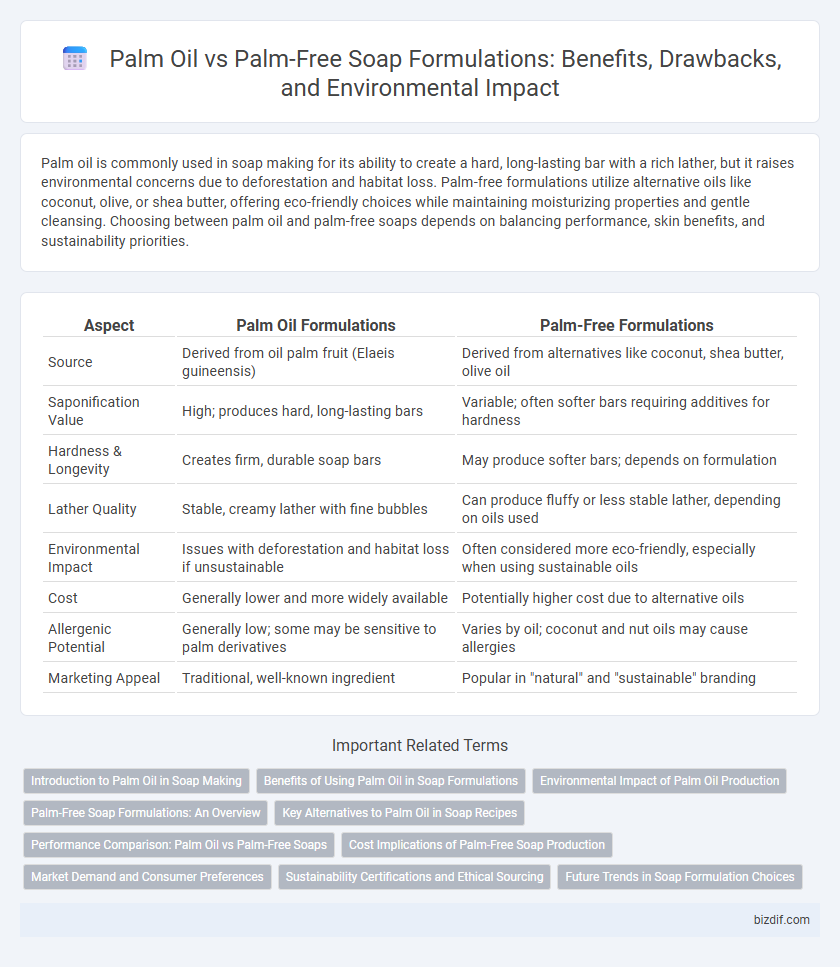Palm oil is commonly used in soap making for its ability to create a hard, long-lasting bar with a rich lather, but it raises environmental concerns due to deforestation and habitat loss. Palm-free formulations utilize alternative oils like coconut, olive, or shea butter, offering eco-friendly choices while maintaining moisturizing properties and gentle cleansing. Choosing between palm oil and palm-free soaps depends on balancing performance, skin benefits, and sustainability priorities.
Table of Comparison
| Aspect | Palm Oil Formulations | Palm-Free Formulations |
|---|---|---|
| Source | Derived from oil palm fruit (Elaeis guineensis) | Derived from alternatives like coconut, shea butter, olive oil |
| Saponification Value | High; produces hard, long-lasting bars | Variable; often softer bars requiring additives for hardness |
| Hardness & Longevity | Creates firm, durable soap bars | May produce softer bars; depends on formulation |
| Lather Quality | Stable, creamy lather with fine bubbles | Can produce fluffy or less stable lather, depending on oils used |
| Environmental Impact | Issues with deforestation and habitat loss if unsustainable | Often considered more eco-friendly, especially when using sustainable oils |
| Cost | Generally lower and more widely available | Potentially higher cost due to alternative oils |
| Allergenic Potential | Generally low; some may be sensitive to palm derivatives | Varies by oil; coconut and nut oils may cause allergies |
| Marketing Appeal | Traditional, well-known ingredient | Popular in "natural" and "sustainable" branding |
Introduction to Palm Oil in Soap Making
Palm oil is a widely used ingredient in soap making due to its ability to produce a hard, long-lasting bar with a creamy lather and stable foam. Its natural fatty acids, such as palmitic and oleic acid, contribute to excellent cleansing properties and moisturizing effects. However, environmental concerns about palm oil sourcing have led soap makers to explore palm-free formulations using alternatives like coconut oil, olive oil, and shea butter.
Benefits of Using Palm Oil in Soap Formulations
Palm oil enhances soap formulations by providing a balanced hardness and excellent lather quality, contributing to long-lasting bars with creamy foam. Rich in natural antioxidants like vitamin E and carotenoids, it supports skin nourishment and gentle cleansing. Its cost-effectiveness and sustainable sourcing options make palm oil a practical ingredient for eco-conscious soap producers seeking quality and environmental responsibility.
Environmental Impact of Palm Oil Production
Palm oil production is a leading cause of deforestation, habitat loss, and increased greenhouse gas emissions, making it a significant environmental concern in soap making. Palm-free formulations help reduce the demand for palm oil, thereby mitigating the impact on endangered species and tropical rainforests. Sustainable alternatives such as coconut oil or shea butter offer eco-friendly options without contributing to biodiversity destruction.
Palm-Free Soap Formulations: An Overview
Palm-free soap formulations exclude palm oil, reducing environmental impact and promoting sustainable ingredient sourcing. These soaps often use alternatives like coconut oil, olive oil, or shea butter, which provide moisturizing properties and a creamy lather. Consumers seeking vegan or eco-friendly options prefer palm-free soaps due to concerns over deforestation and biodiversity loss associated with palm oil production.
Key Alternatives to Palm Oil in Soap Recipes
Key alternatives to palm oil in soap making include coconut oil, olive oil, and shea butter, each providing unique moisturizing and lathering properties. Sustainable options like sunflower oil and castor oil are increasingly favored for their biodegradability and ethical sourcing. Incorporating palm-free oils supports environmentally friendly formulations while maintaining soap quality and performance.
Performance Comparison: Palm Oil vs Palm-Free Soaps
Palm oil soaps deliver rich lather and long-lasting hardness due to their high saturated fat content, enhancing durability and moisturizing properties. Palm-free formulations often use alternatives like coconut, olive, or shea butter oils, which provide gentler cleansing and improved skin nourishment but may yield softer bars with quicker wear. Choosing between palm oil and palm-free soaps depends on prioritizing bar longevity versus eco-friendly ingredients and skin sensitivity.
Cost Implications of Palm-Free Soap Production
Palm-free soap production generally incurs higher costs due to the reliance on alternative oils like coconut, olive, or shea butter, which tend to be more expensive than palm oil. The lack of palm oil's high yield and affordability often leads to increased raw material expenses, impacting the overall price of palm-free soaps. Manufacturers must balance sustainability goals with cost efficiency, as palm-free formulations can result in pricier end products compared to palm oil-based soaps.
Market Demand and Consumer Preferences
Palm oil remains a dominant ingredient in soap making due to its cost-effectiveness and ability to create hard, long-lasting bars, driving strong market demand. Consumer preferences are shifting toward palm-free formulations as awareness of environmental and ethical concerns grows, leading to increased interest in sustainable and cruelty-free soap products. Market trends indicate rising sales in palm-free soaps, particularly among eco-conscious and health-focused consumers seeking alternative oils like coconut, olive, and shea butter.
Sustainability Certifications and Ethical Sourcing
Palm oil used in soap making often carries sustainability certifications such as RSPO (Roundtable on Sustainable Palm Oil) and ISCC (International Sustainability and Carbon Certification), ensuring ethical sourcing and reducing deforestation impact. Palm-free formulations typically rely on alternative oils like coconut or olive oil, which may offer different environmental footprints but lack unified global certification standards comparable to palm oil. Ethical sourcing in both palm and palm-free soaps emphasizes traceability, fair labor practices, and minimizing ecological harm throughout the supply chain.
Future Trends in Soap Formulation Choices
Palm-free soap formulations are gaining momentum due to increasing environmental concerns over deforestation linked to palm oil production. Innovations in alternative oils such as shea butter, coconut oil, and sustainable seed oils are driving future soap formulations toward eco-friendly, biodegradable options. Consumer demand for cruelty-free, allergen-free, and ethically sourced ingredients will further shape industry standards away from traditional palm oil usage.
Palm Oil vs Palm-free Formulations Infographic

 bizdif.com
bizdif.com